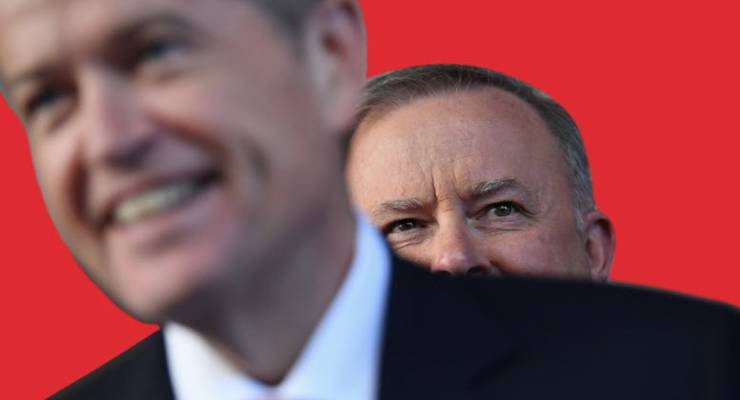
Bill Shorten has stepped down as Labor leader, after more than five years in the job (a longer term than that of either of his immediate predecessors). Replacing him will be a messy task, but it will also determine the path Labor takes during these next three years in the wilderness.
How does the selection process work?
Formal nominations for the leadership close within the week, then candidates have 20 days to campaign to the country’s rank and file membership. Expect public debates over franking credits, Adani, and other policies many suspect (but haven’t exactly proven) cost Labor the election.
A ballot vote will then be held, with equal weight given to all Labor members (53,000 as of the end of 2017) and the caucus (MPs, senators etc). Members need to have been with the party for a full year before voting.
There’s also an apparent arrangement that, if a Labor Right member wins, a Left member serves as their deputy. Since Tanya Plibersek announced she would not run on Monday, this means her future as deputy leader could depend on a Right member succeeding.
Shorten will continue as acting leader until the vote.
Who’s definitely running?
Anthony Albanese: In the Left corner, Albo practically announced his candidacy before Shorten had even finished his concession speech. Since entering Parliament in 1996 and presiding over a number of ministries, Albanese won the 2013 membership vote 60-40 but came in at a final total of 48-52 due to overwhelming caucus support for Shorten.
Since then he’s run as opposition spokesperson for infrastructure; pushed for his beloved pipe dream of a Very Fast Train; and done many, many DJ sets. More pointedly, he’s recently positioned himself further to the political centre than even Shorten on some issues. He publicly cosied up to business before the then-crucial 2018 byelections; he recently dismissed calls for a Newstart raise; he claimed Greens voters were suffering from “increasingly extreme groupthink” on the Adani mine; and, just last night, he flagged reforms on franking credits.
Basically, he’s the obvious choice for a party in damage control after too many slightly progressive policies.
Chris Bowen: On the Right, the shadow treasurer has just announced his candidacy this morning. The architect of Labor’s controversial scheme to end cash rebates for franking credits, Bowen is somewhat of a surprise nomination — especially since the unfortunate “don’t vote for us” gaffe earlier in the year.
However, Bowen has since handled the issue well under pressure during election debates (and a Q&A special). Like Albanese, he also has strong party experience. Bowen has previously served Labor governments as treasurer; minister for small business; minister for immigration and citizenship; and minister for financial services, superannuation and corporate law. During the Albo-Shorten fight, he also served as acting Labor leader.
Who might throw their hat in the ring?
Both shadow finance minister Jim Chalmers and shadow agriculture minister Joel Fitzgibbon have signaled interest in the role. As a young Queenslander and Adani-supporting regional representative respectively, they are similarly pushing for centrist reforms.
Tony Burke and Richard Marles have also been flagged as possible contenders. And, while she hasn’t actually declared interest in the role, Linda Burney was briefly trending on Twitter this week following calls for her to run. Labor has never had an Indigenous leader.
Who’s out?
While electorally popular, both Tanya Plibersek and Penny Wong have both outright rejected going for the role. So unless Burney goes for a surprise run, this is likely to be a contest fought between white men.
Who’s the hot tip?
Not that anyone should trust the polls after Saturday (although maybe leadership points count for more than we thought), but Albanese is the obvious frontrunner here. Time will tell if that translates to caucus support.








Albanese’s swing to the right and cosying up to business as of late puts question marks over him being a good choice in the long term, although after losing the unloseable, I daresay Labor will swing back to the practical rather than transformational.
If Albanese counts for being on the Left now, then Labor is truly screwed.
Frankly, as with all major decisions, the task, as per the headline, is elementary. The question turns ENTIRELY upon how the Labor party (collectively) perceives themselves and their (collective) contribution to the country. What OUGHT to be apparent, given recent experience, is the reality that any attempt to appear as all things to everyone will invite only contempt.
The working class nowadays (a generic name to include manual workers, in the main, but shop-assistants, hospitality workers and others on hourly wages) with its reasonably good working conditions and institutionalised superannuation plans, contract bonuses etc., can no longer be compared to what constituted the class in the 50s or the 60s or indeed the 70s. Corbyn actually recognises this point; as does Boris Johnson. That observation may serve as point one.
The second and somewhat inherently related point concerns what ought to be considered as “the Left” nowadays. To claim that the Left comprises that group of adherents who subscribe to a distribution of the GDP which is commensurate with the contribution of their labour and NOT their salaries or wages would be a good start. At this point we might cast an eye over the Critique of the Gotha Program which could be supplemented with a graph of real wage growth AND CEO salaries for the last 25 years with time as the independent variable.
The greenie stuff is NOT inherently a concern of the Left. The Left, as conveyed, is ONLY concerned with the distribution of what the country has produced. As to how the product is produced is not an immediate concern of the Left save for safe work practices and appropriate regulations for workers’ compensation etc.
Forcing the point, the Quixotish identity politics stuff gives the Left a bad name. The country has legal homosexual marriage; leave it at that.
Fourthly, it is all very well to bang on about the ills of dividend imputation (a corporate tax avoidance scheme) but other matters confronting the late millennials and Gen Z are much more urgent. They include the effect of fifth generation (i.e. current technology) robots can can undertake clerical (e.g. process insurance forms) and manual (assemble cars etc) tasks and the inevitable effects of the forthcoming 6th generation robots. Then we have off-shore contracting, by email or conferencing, for everything from accountancy to zoological research.
If there wasn’t enough on the plate there is the question of how (roughly) $120,000 of student debt and about $850,000 of house will come to be serviced. Just as well interest rates are what they happen to be. Try this trick at an interest rate of (e.g.) 12%. Just for giggles take a look at the Bureau of Stats site what are the implications for taxation?
The only 3rd world countries (that will be compelled to remain in their present state – and that will suit their governors no end) will engage in primary production and manufacturing. For Australia there will be (by some miracle) a very low-employing primary sector and a tertiary (or service) sector. Interesting to see that the occupation of police officer is among the top choices of the semi-educated and even a few graduates in NZ. There isn’t a lot of job security about.
Ok : enough “big picture stuff”. Let’s have some reality. Me, the frustrated statistician, wanted some explanations as to the swing in Queensland and the static effect in WA. I have no desire to bang the eye of the gentle reader but a few remarks are in order and in addition to what I have written on those pages over the last two days (from Sunday). I received the following reply from a few female high school teachers; one who teaches English and History and I offer three quotes.
“The left dont realise how extreme they are. The are supposed to be the workers’ party, not the pity party which focuses on the next group of people they can feel sorry for. Workers can’t survive without capitalism. ”
“The memory of the mining boom is still clear in people’s minds in QLD. They want economic security again. The cost of living is too high for the average person. On top of this money doesn’t flow up north. The government always allocates to infrastructure around Brisbane and the Gold Coast. Of course the population is exploding in this areas but they’ve been angry about this for a decade at least”.
“Labor’s strategy of not positioning themselves as standing for anything other than building the economy left the door open for support for the moderates. Labor focuses on issues that many see as irrelevant. Hat off to Morrison”
I have done what I can to correct some misconceptions here, especially in regard to the boom in QLD which was little more than a redistribution of resources but a boom was perceived nevertheless. Interesting to note that the price of ore now is roughly what it was during the boom with nothing like the same effect upon the economy.
—
I’ll leave it there and sit back have a beer; and watch the hopefuls make a monkey’s butt of it. ho hum.
They cant win with Albanese, he is held to the far left by Greens in Marrickville. Bowen is failed, poor policies and never had a job outside Unions or Labor machine. Chalmers is only hope or a Wayne Swan return
Clare is the dark horse smart choice